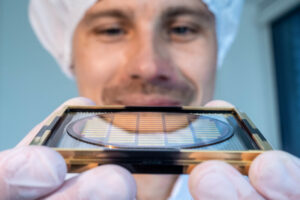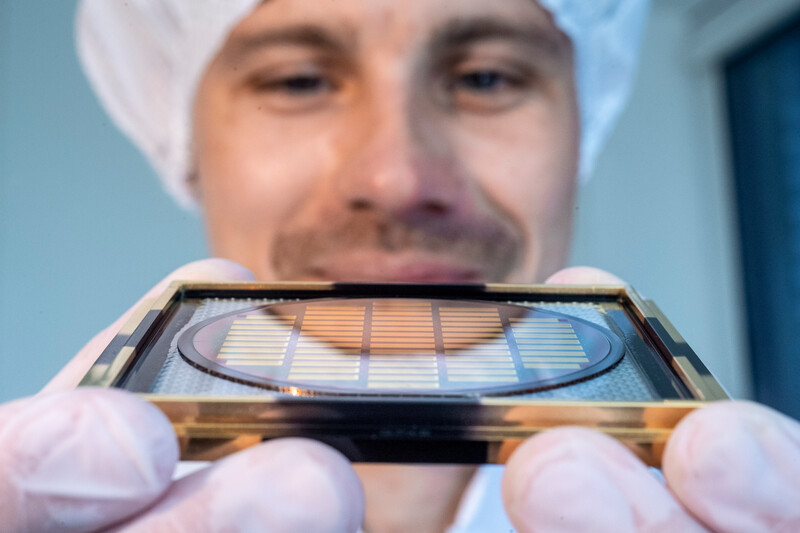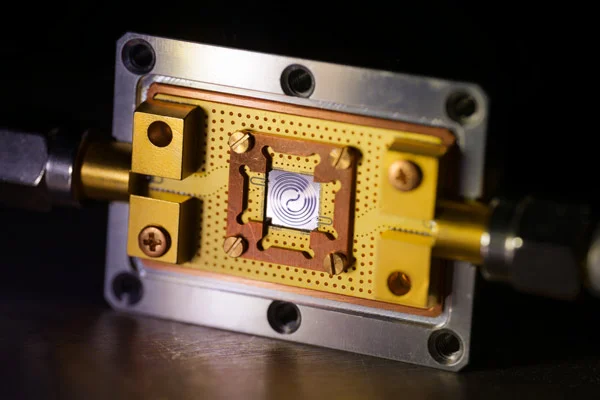
PRESS RELEASE — A consortium around the quantum start-up Q.ANT will receive around 50 million euros in research funding. The Federal Ministry of Education and Research will assume around 42 million euros of this, while the consortium partners will contribute around 8 million euros.
The funding is intended to be used to set up a demonstration and test facility for photonic quantum computer chips and other quantum computer components. The consortium is to research algorithms and technologies for photonic quantum computing and prepare for industrial use.
Q.ANT, a wholly owned subsidiary of TRUMPF, recently presented a process that enables the production of very powerful quantum computer chips. By applying highly specialized light channels to silicon chips, this so-called photonic chip process can be used to guide, control and monitor quanta with virtually no loss, even at room temperature. In the future, this will also enable the chips to be used in conventional mainframe computers.
Quantum Computer Made in Germany

“The funding is an important signal for Germany as a location for innovation. We are at the beginning of the quantum computer age and the global race for market shares of this future technology has begun. The funds now made available for this research alliance are an important building block for a quantum computer made in Germany,” says Michael Förtsch, CEO of Q.ANT. The research project is called “PhoQuant” and will run for five years. A total of 14 other German companies, applied research institutes and universities belong to the consortium under the industrial leadership of Q.ANT.
Quantum Computer Chips and Workstations
From today’s perspective, fields of application for a computer with quantum chips are, for example, in the chemical industry, biomedicine or materials science.
“Collaboration between cutting-edge research and companies is the key to quantum computer chips from Germany and the corresponding jobs. Only if business, universities and applied research institutes cooperate closely can successful industrial products also be created from the know-how of Germany as a location for science,” says Förtsch. The project partners want to present a first prototype within two and a half years. In five years at the latest, a quantum computer chip is to be created that can perform far-reaching calculations.
Basic Research From Germany
The Institute for Photonic Quantum Systems (PhoQS) will bundle the expertise available at the Paderborn site in the areas of integrated optics and quantum optics, quantum information theory, algorithms and electrical engineering in order to implement, control and characterize large quantum systems for light-based quantum information processing. “In the last few years and decades, we have done pioneering work in basic science that is world-leading in this field. The project gives us the opportunity for the first time to put this into practice with demonstration structures,” says Prof. Dr. Christine Silberhorn from the University of Paderborn.
From Research to Application
The partners involved bring various competencies to the consortium. The universities should develop and contribute basic knowledge on the behavior of quanta. The applied research institutes are intended to support the transfer of knowledge into practical processes. The start-ups involved are to develop and build components of quantum computer chips.
The “PhoQuant” project is part of the BMBF framework program “Quantum technologies – from the basics to the market”. The Fraunhofer Institute for Applied Optics and Precision Engineering IOF in Jena, for example, is involved. “As part of this project, Jena researchers are developing, among other things, integrated optical quantum light sources and low-loss integrated optical and fiber-optic interferometers as elementary components of photonic quantum computers,” says Prof. Dr. Andreas Tünnermann, director of the Fraunhofer IOF. “In addition to expertise in quantum optics and photonics, this requires know-how in hybrid assembly and connection technology. We bring these skills to the highly dynamic project in order to implement our common goal together with all the companies and institutions involved: to realize a powerful photonic quantum computer.”
A total of 14 partners are working together on the research project:
- Q.ANT GmbH
- Paderborn University (UPB)
- Westfälische Wilhelms-Universität Münster
- Fraunhofer Institute for Applied Optics and Precision Engineering
- Friedrich Schiller University Jena
- Ulm University
- HQS Quantum Simulations GmbH
- Humboldt University of Berlin
- Fraunhofer Institute for Photonic Microsystems
- Swabian Instruments GmbH
- TEM measurement technology GmbH
- ficonTEC Service GmbH
- Free University of Berlin
- Menlo Systems GmbH
Source: Google Translate from German original release.
For more market insights, check out our latest quantum computing news here.














